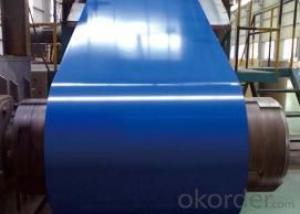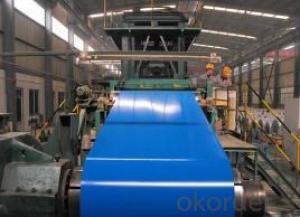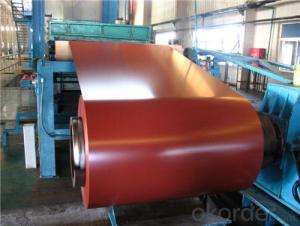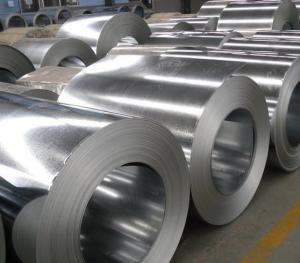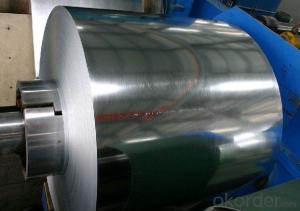Color Coated Alu-zinc Steel Coil PPGP for Constructions
- Loading Port:
- Shanghai
- Payment Terms:
- TT OR LC
- Min Order Qty:
- 20 m.t.
- Supply Capability:
- 10000 m.t./month
OKorder Service Pledge
OKorder Financial Service
You Might Also Like
| Standard: | AISI,ASTM,BS,DIN,GB,JIS | Grade: | SGCC,SGCD1,SGCD2.SGCD3,SGC340, | Thickness: | 0.17-2.0mm |
| Place of Origin: | China (Mainland) | Brand Name: | Model Number: | SGCC,SGCD1,SGCD2.SGCD3,SGC340, | |
| Type: | Steel Coil | Technique: | Cold Rolled | Surface Treatment: | Coated |
| Application: | widely | Special Use: | High-strength Steel Plate | Width: | 600-1250mm |
| Length: | coil |
Packaging & Delivery
| Packaging Detail: | standard sea-worthy packaging or as buyers' requirement. |
| Delivery Detail: | Within 20-30 days after we receive depoist or L/C at sight |
color coated steel coil
Product Description
Company | CNBM |
Product | color coated steel coil |
Port | Shang Hai China |
Thickness | 0.17-2.0mm |
Width | 600-1250mm |
Material Grade | SGCC,SGCH,SGCD1-SGCD3,DX51D |
Technique | cold rolled |
Standard | ASTM,GB ,AISI,JIS,EN |
Test | With Hydraulic Testing, Eddy Current , Infrared Test |
Application | Widely used for roofs, outer walls, ovens, explosive-proof steel, electrically controlled cabinets,galvanized tube/pipe, ceiling channel, building material |
Surface | coated |
Package | standard sea-worthy packaging or as buyers' requirement. |
MOQ | 20 tons |
Payment | L/C,T/T |
Delivery time | According to The Specifications And the Quantities,Time Begin When We confirm the Date of the Earnest or L/C. |
- Q:How are steel coils tested for compliance with industry standards?
- To ensure compliance with industry standards, steel coils undergo a series of rigorous quality control measures. These tests are conducted to verify that the coils meet necessary specifications and are suitable for various applications. Among the primary tests performed on steel coils is dimensional inspection. This entails measuring the thickness, width, and length of the coils to ensure they fall within specified tolerances. Any deviations from the required dimensions may indicate manufacturing defects or potential issues during fabrication. Another crucial test is visual inspection, where trained inspectors meticulously examine the coils for surface defects like scratches, dents, or cracks. Identifying and rectifying these defects is essential as they can impact the performance and durability of the steel coils before they are supplied to customers. Additionally, mechanical properties testing is carried out to assess the strength, elasticity, and toughness of the steel coils. This includes conducting tests for tensile strength, yield strength, and elongation measurements. These evaluations help determine if the coils are suitable for specific applications and if they meet the required performance standards. Furthermore, chemical composition analysis is performed to validate the elemental composition of the steel coils. This analysis is crucial as it ensures that the steel meets the required chemical requirements, including the presence of specific alloying elements. Deviations in composition can significantly affect the overall quality and performance of the coils. Corrosion resistance testing is also of great importance, particularly for coils used in environments with high humidity or exposure to corrosive substances. Coils are subjected to simulated real-world conditions, such as salt spray or humidity chambers, to evaluate their resistance to corrosion. Lastly, various non-destructive testing techniques, including ultrasonic testing and magnetic particle inspection, are employed to detect internal defects or discontinuities in the steel coils. These tests assist in identifying any hidden flaws that could compromise the structural integrity of the coils. In summary, steel coils undergo a comprehensive array of tests to ensure adherence to industry standards. By conducting these tests, manufacturers can guarantee that the coils meet the required specifications, thereby providing customers with high-quality products tailored to their specific needs.
- Q:How are steel coils used in the production of structural steel?
- Steel coils are widely used in the production of structural steel due to their versatility and efficiency. These coils, which are made by rolling steel into a cylindrical shape, serve as the raw material for various structural steel products. One of the primary uses of steel coils in the production of structural steel is in the manufacturing of beams and columns. These coils are processed in steel mills, where they undergo cutting, shaping, and bending to form the desired profiles. Beams and columns are essential components of any building or infrastructure project as they provide support and stability. Steel coils are also used in the fabrication of steel plates, which are widely used in the construction industry. These plates are used for flooring, cladding, and roofing purposes, adding strength and durability to structures. By using steel coils as the starting material, manufacturers can produce steel plates of various thicknesses and sizes according to project requirements. Furthermore, steel coils are an integral part of the production process for pipes and tubes. These coils are formed into a cylindrical shape and then welded or seamless to create pipes and tubes of different diameters. Steel pipes and tubes are vital for various applications, including water and gas transportation, structural frameworks, and industrial systems. In addition to these applications, steel coils are also used in the production of other structural steel products such as angles, channels, and hollow sections. These products are widely used in construction projects, providing structural support, reinforcement, and aesthetic appeal. Overall, steel coils play a crucial role in the production of structural steel by serving as the raw material for various products. Their versatility, ease of processing, and strength make them an ideal choice for manufacturers, ensuring the production of high-quality and reliable structural steel components.
- Q:What are the different types of coatings applied to steel coils?
- There are multiple types of coatings that can be applied to steel coils, including galvanized coatings, which involve applying a layer of zinc to prevent corrosion; organic coatings, such as paints or lacquers, which provide protection and enhance aesthetics; and metallic coatings, like aluminum or tin, which offer corrosion resistance and improved appearance.
- Q:What are the factors that determine the price of steel coils?
- The factors that determine the price of steel coils include the current demand and supply levels in the market, the cost of raw materials and energy, the production and labor costs, transportation and logistics expenses, market competition, government policies and regulations, as well as currency exchange rates.
- Q:How are steel coils used in the manufacturing of industrial compressors?
- Steel coils are used in the manufacturing of industrial compressors primarily for the construction of the compressor's casing and frame. The steel coils are shaped, cut, and welded to create the sturdy and durable structure that houses the compressor components. Additionally, the steel coils may also be used in the fabrication of other parts such as motor mounts or brackets, contributing to the overall reliability and stability of the compressor.
- Q:Can steel coils be used in outdoor applications?
- Indeed, outdoor applications can make use of steel coils. Steel, recognized for its resilience and robustness, proves to be ideal for various outdoor purposes. Commonly utilized in construction, automotive manufacturing, and transportation industries, steel coils exhibit resistance against adverse weather conditions like rain, snow, and UV exposure. Furthermore, to enhance their durability and prolong their lifespan, steel coils frequently undergo protective finishes such as galvanized or painted coatings. Ultimately, owing to their strength, durability, and ability to withstand environmental factors, steel coils emerge as a dependable and versatile choice for outdoor applications.
- Q:What are the safety precautions while handling steel coils?
- Some safety precautions while handling steel coils include wearing protective gloves and clothing to prevent cuts and scrapes, using proper lifting techniques to avoid back injuries, ensuring a clear and organized work area to prevent tripping hazards, and using appropriate equipment, such as forklifts or cranes, to safely move and stack the coils. It is also important to follow proper storage procedures to prevent the coils from falling or shifting and causing accidents.
- Q:I plan to buy a bushcraft knife ..The blade made up by damascus steel.My question is ,is damascus steel is very strong ?
- Ok, lets define what is Damascus steel. The modern Damascus is basically any steel that shows a pattern. Patterns are accomplished by 1. manipulating the crystal structure or 2. by combining 2 or more different alloys together. The blade you are looking at is referred to as a pattern welded blade. Damascus is only as strong as it's base components + heat treat and design. The strongest will be obtained by combining high carbon and low carbon steels. I do this by using steel cable. The patterns aren't real bold but are interesting none the less. To break it you must brake the hard steel and tear through the soft iron. The laminated stuff works the same way. For greater edge holding I use all high carbon, varying alloy content from simple carbon to chromium/nickle alloys. These are what you normally find in pattern welded blades. A fine pattern that has many lamination's crossing the edge will offer the best edge holding. Properly done one can get the DCE or damascus cutting effect where the soft layers wear away faster than the hard layers almost making the blade self sharpening. Is that blade good? Buy it if you like it, it won't compare to a well made hand forged blade but is much cheaper. sorry for the overload.
- Q:How do steel coils contribute to the HVACR industry?
- Steel coils play a crucial role in the HVACR (Heating, Ventilation, Air Conditioning, and Refrigeration) industry by serving as a primary component in various applications. These coils are typically made from a durable and corrosion-resistant material, such as stainless steel or galvanized steel, which ensures their longevity in demanding HVACR environments. One of the most common uses of steel coils in the HVACR industry is in air conditioning systems. These coils are responsible for transferring heat between the refrigerant and the surrounding air. The coils, often referred to as evaporator coils, absorb heat from the indoor air, cooling it down and removing moisture. They then release the heat outside through a condenser coil, allowing for efficient cooling and dehumidification of the air. Steel coils are also utilized in heat exchangers, which are vital components in HVACR systems. Heat exchangers transfer thermal energy between two fluids, allowing for efficient heating or cooling. Steel coils, often in the form of finned tubes, provide a large surface area for heat transfer and help enhance the overall efficiency of the system. Furthermore, steel coils are extensively used in the construction of ductwork, which is the network of channels that distribute conditioned air throughout a building. These coils are formed into various shapes and sizes to fit specific ductwork designs, ensuring optimal airflow and temperature control. Additionally, the durability and strength of steel coils make them suitable for withstanding the pressure and forces exerted by airflows in duct systems. In refrigeration systems, steel coils are integral to the process of transferring heat out of an enclosed space, such as a refrigerator or freezer. The coils, often referred to as condenser coils, release heat from the refrigerant as it changes from a high-pressure gas to a high-pressure liquid. This allows for the cooling and preservation of perishable goods, making steel coils essential in the food service and cold storage industries. Overall, steel coils contribute significantly to the HVACR industry by enabling efficient heat transfer, optimal temperature control, and reliable operation of various HVACR systems. Their durability, corrosion resistance, and versatility make them a crucial component in providing comfortable and controlled environments in residential, commercial, and industrial settings.
- Q:What are the different types of steel coil surface treatments for corrosion resistance?
- To enhance corrosion resistance, different methods are utilized for treating the surface of steel coils. These treatments create a protective layer that prolongs the lifespan of the steel and prevents corrosion. Some commonly used treatments for corrosion resistance include: 1. Galvanizing: Widely recognized as an effective method, galvanizing involves applying a layer of zinc to the steel coil's surface. The zinc acts as a sacrificial anode, corroding before the steel, thus safeguarding it against rust and corrosion. 2. Chromate conversion coating: This treatment entails applying a chromate-based solution to the steel coil's surface. The chromate forms a thin film that serves as a protective barrier against corrosion. Moreover, it improves the adherence of paint or other coatings that may be applied subsequently. 3. Phosphating: Phosphating is a process where a phosphate coating is added to the steel coil. This coating establishes excellent corrosion resistance by chemically bonding with the steel surface. It also enhances the adherence of subsequent coatings or paints. 4. Organic coatings: These coatings comprise paint or epoxy and are applied to the steel coil to create a barrier between the steel and its surroundings. They offer corrosion resistance and enhance aesthetic appeal. The selection of organic coating depends on the specific application and the desired level of corrosion protection. 5. Zinc-rich paint: Similar to galvanizing, zinc-rich paint contains a high concentration of zinc particles. When applied to the steel coil, these particles provide sacrificial protection, preventing corrosion. This coating is commonly employed in harsh environments or for steel coils exposed to frequent moisture or saltwater. It is important to consider various factors such as the application, environment, budget, and required level of corrosion resistance when choosing a surface treatment. Consulting with a steel coil manufacturer or corrosion specialist is advisable to determine the most suitable treatment for a specific situation.
1. Manufacturer Overview |
|
|---|---|
| Location | |
| Year Established | |
| Annual Output Value | |
| Main Markets | |
| Company Certifications | |
2. Manufacturer Certificates |
|
|---|---|
| a) Certification Name | |
| Range | |
| Reference | |
| Validity Period | |
3. Manufacturer Capability |
|
|---|---|
| a)Trade Capacity | |
| Nearest Port | |
| Export Percentage | |
| No.of Employees in Trade Department | |
| Language Spoken: | |
| b)Factory Information | |
| Factory Size: | |
| No. of Production Lines | |
| Contract Manufacturing | |
| Product Price Range | |
Send your message to us
Color Coated Alu-zinc Steel Coil PPGP for Constructions
- Loading Port:
- Shanghai
- Payment Terms:
- TT OR LC
- Min Order Qty:
- 20 m.t.
- Supply Capability:
- 10000 m.t./month
OKorder Service Pledge
OKorder Financial Service
Similar products
New products
Hot products
Hot Searches
Related keywords

